Review: Extremely Beautiful & Incredibly Sad
An aching examination of friendship breakups in “Close” (+, a gay Oscars roundup!)
Stick around after this review for a comprehensive list of all the queer films nominated for Oscars this weekend. And instead of our usual Drag Race recap, we’ll highlight some actionable items in the fight against drag bans and anti-trans legislation.
The Yearning Rating: ✰✰✰½
Significant spoilers incoming for Lukas Dhont’s Close and a trigger warning for discussion of suicide.
Written by Meg Heim
Close caught my eye months ago, when the gorgeous, cinematic trailer stopped me in my tracks on Instagram. Two boys, running full tilt, through a field of flowers in the sunshine with huge smiles on their faces. (We’ve already established that I’m a sucker for paradisal European cinema.) The movie poster is equally captivating, featuring one of the two main boys, Léo, staring directly into the camera with eyes both hauntingly soft and full of hurt. The movie is everything that the breathtaking promotional footage promises it will be: it is absolutely, chest-achingly beautiful and deeply sad.
Close tells the story of Léo and Rémi, 13-year-old best friends in Belgium. From the opening shots, you immediately understand the, well…closeness between these two boys. Their friendship has profound intimacy. After an idyllic summer of playing together every day in the flower fields of Léo’s family farm or in Rémi’s strikingly red bedroom, nightly sleepovers (in the same bed), and goofy family dinners with Rémi’s parents, the two boys bike off to their first day of high school. It becomes immediately clear that their intimacy with each other stands out from the typical social fabric of their school. A wide angle shot lingers, hesitating, on the two boys standing uncomfortably in their school yard on the first day of classes; I was holding my breath in fearful anticipation for the two of them.
Eden Dambrine, who plays Léo, and Gustav De Waele, who plays Rémi, both do a beautiful job of capturing the innocence and gentleness of preteens as I know they can be: not prematurely aged by the internet, and existing before high school has had the chance to blow up their sense of selves with the pressures of social safety and success. There is also the matter of AMAB people going through puberty slower and typically later than AFAB people; this is also underscored in Close. Léo and Rémi both feel markedly young, small and childlike in the sea of tumultuous freshmen energy. Two girls, distinctly bigger than both of them, ask the friends point blank in the cafeteria if they are dating. “It’s clear that you two are a couple,” one of them says bluntly. The energy shifts, with Léo instantly tense and reactive. “We’re close because we’re best friends,” he says, speaking for the two of them. Rémi observes this interaction silently, with a neutral expression on his face.
Léo’s anxiety to dispel this perception, and the steps he takes to do so, are so palpable it hurts. Fearful of the homophobic slurs being directed at them by other boys in their year, Léo slowly and deliberately begins to push Rémi away. Remi, in response, is confused, distressed and reeling from the apparent loss of his best friend for no known reason. Rémi’s quiet devastation instantly transported me back to navigating the complexity of friendship in my own adolescence.
There is nothing worse than that weight in your stomach, that sinking feeling—when you just know that something is wrong. Your friend is acting differently; their frequency is just slightly off. The distance can happen in inches, millimeters, fractions of fractions, so imperceptible that there’s no proof except for the pain in your own chest. You spiral and feel a crazy desperation building—maybe you need to apologize, or make yourself smaller to still fit into their life. As these wild ideas form, some other part of you knows that acting on any of them will just make matters worse. But you can’t help it—that blinding, anticipatory fear of losing them is too loud.
Watching this movie made me reflect on a friendship breakup of my own. A friendship lost, seemingly with no answers as to why or how it happened; and sometimes years later, despite knowing that I need to move on, I still revisit it. As I watched Close, Rémi’s desperation resonated inside that empty, hurt space. In a way that felt familiar, Rémi regularly attempted to rebuild what the two had. One night, as tensions have been continuing to build at school, the two boys decide to sleepover at Rémi’s. Léo breaks from the norm, sleeping on a separate mattress. Upon waking up, he finds Rémi asleep next to him. The two begin to wrestle. The roughhousing starts off playful, but becomes increasingly rough until Rémi breaks away, hurt and confused. The physical, mirroring the interior, brings his pain to the surface.
As the school year continues, Léo becomes increasingly distant from Rémi and resists his attempts to spend time together. He joins the ice hockey team and deliberately excludes Rémi from it, and begins spending most of his time outside of school with a group of other, rougher boys. Eventually, Léo and his classmates are rushed home early from a field trip that Rémi is absent from. When his mom comes to retrieve him, Léo learns the horrific truth—Rémi has committed suicide.
I grappled with whether or not to include this major spoiler in my review, but ultimately decided I would because I wanted the opportunity to properly critique it. The first half of this movie, prior to Rémi’s death, is a stunning articulation of friendship, masculinity, and the universal understanding men and boys arrive at, which is that, at some point, they must cast aside their softness and pick up something that is harsher and more distant. But this is a writing choice that I would not have made—and when it happened, it felt like the air was taken out of the theater. Not only was it a loss to learn that De Waele (an incredible talent and first time actor along with his costar, Eden Dambrine) would no longer be on screen, it was a bit too extreme for me. The shock value certainly packs an emotional punch but I personally feel that there would have been other, less violent ways to achieve this.
I don’t begrudge Lukas Dhont—who speaks beautifully about the film and its origins in this extended interview with Stream Wars3—this choice. His first feature, Girl, also features a jarring and gruesome plot device (for which he has received a fair amount of criticism) and this one-two punch of emotional intensity and shock value may just be his style. Close is beautifully brutal. I think, at its center, the movie gets at how scary it is to attempt to understand who you are and who you will be, all through the haze of puberty and social scrutiny. The pressure cooker of high school and preadolescence attempted to force Léo and Rémi to label their love for each other, in a way that neither of them yet had the capacity to. And I think 13-year-olds are rarely able to give themselves (or others) grace in doing that kind of self-excavation. That so often just takes time and heartbreak.
The second half of Close also allows for one of the most haunting performances of motherhood on screen that I’ve seen in recent memory—and that is the one given by Émilie Dequenne. Dequenne plays Rémi’s mother, Sophie, a loving and patient parent who feels deeply connected to her quiet son and his best friend. At the beginning of the movie, Sophie calls Léo ‘un fils de coeur dévoué’, or a ‘devoted son of heart’, meaning that she sees him as just as much her son as her own child. After Rémi dies, their dynamic intensifies. Sophie is drawn to Léo; as a viewer, you can tell that she instinctively knows that the boys’ friendship is somehow related to Rémi’s death. There is mastery of tension in the relationship between the two of them; the two repeatedly seek each other out, despite neither being able to actually bear the proximity to each other and the weight of Rémi’s absence.
This comes to a head as Léo, exhausted from fighting his grief and guilt, appears at Sophie’s place of work. A maternity nurse, a world-weary Sophie lays down a crying baby to step aside and talk with him. She ends up offering him a ride home. Finally, Léo finds the courage to say what he has been trying to for so long—he confesses to Sophie that he pushed Rémi out of his life, and that (he believes) this led to him taking his life. Sophie, at her breaking point, screams at Léo to get out of the car. She’s actually frightening here, and I appreciated the ugliness; she is so present in her own anguish that, for a moment, she allows herself to feel and act upon the full weight of the unimaginable pain. Dequenne’s portrayal is shocking and powerful. When Léo flees, she chases after him and ultimately embraces him in tears. It’s this climactic sign of acceptance that finally mitigates Léo’s agony.
Léo and the trauma he experiences forces him to age; Close begins with him shirking off work on the family farm and pushing his brother aside, who jokingly asks him if he is ever going to help the family harvest flowers. By the end, Léo works alongside his family until dusk, smeared in dirt and touting his ability to keep up with their massive tractor. He repeatedly seeks out intimacy wherever it may be, crawling into his brother’s bed at night or trying out sleepovers with a new boy from school. But loss is sadly central and pervasive in the ending of this movie; the loss of friendship, love, and innocence in equal measure. I think Dhont may underestimate the experience of grief when you lose a friend. While he certainly understands its lasting impact, he believed that a suicide was needed to carry the emotional weight of this plot and these themes through. I feel that Close would have been just as significant without. That grief always comes, even if that former friend is still walking around in this world.
Close is in theaters and available to stream online, see options here.
Love this review? Have a huge crush on us? Please consider hitting the ♥ button on this post—that way, more readers can discover us on Substack.
Gays Getting Awards (LGBTQ+ 2023 Oscars Nominees)
⭑ Everything Everywhere All at Once
What else is there to say about this gorgeous film?
Everything Everywhere All at Once received eleven(!) Oscar nominations: Best Picture, Best Director (Daniel Kwan and Daniel Scheinert), Best Actress (Michelle Yeoh), Best Supporting Actress (Stephanie Hsu; Jamie Lee Curtis), Best Supporting Actor (Ke Huy Quan), Best Original Screenplay (Daniel Kwan and Daniel Scheinert), Best Original Score, Best Costume Design, and Best Film Editing. And sad bisexuals rejoice! Everything Everywhere All at Once was also nominated for Best Original Song –“This is a Life”, co-written by 2 dudes and MITSKI!
⭑ TÁR
The Academy graced Lydia Tár TÁR with nominations for six Oscars: Best Picture, Best Director (Todd Field), Best Actress (Cate Blanchett), Best Original Screenplay (Todd Field), Best Cinematography, and Best Film Editing.
TÁRheads rise up! If you want to know why this is my favorite movie of the year, you can read my review here.
⭑ The Whale
The Whale received three nominations: Best Actor (Brendan Fraser), Best Supporting Actress (Hong Chau), and Best Makeup & Hairstyling. Woof.
⭑ Glass Onion: A Knives Out Mystery
Our sources tell us Janelle Monáe just missed out on a Best Supporting Actress nom :/ Glass Onion earned a nomination for Best Adapted Screenplay.
⭑ Aftersun
Aftersun received one nomination in the Best Actor category (Paul Mescal).
Paul Mescal is so busy these days! This under the radar feature is the debut of queer creator, Charlotte Wells. Queerness is open-ended in this reflective drama about a father and daughter relationship. “My characters are always going to be queer by default,” Wells told the Los Angeles Times in an interview this December. That both father and daughter are queer is inferred or subtly explored throughout this film. Read more about it here.
⭑ Close
Close was nominated for Best International Feature Film.
⭑ All the Beauty and the Bloodshed
All the Beauty And The Bloodshed was nominated for Best Documentary (Feature).
This documentary follows the life and career of photographer Nan Goldin. Goldin was well known for documenting LGBTQIA+ communities during the AIDS crisis, and later advocated against Big Pharma for their role in the opioid crisis.
⭑ Lady Gaga’s “Hold My Hand”
Lady Gaga’s “Hold My Hand” from the Top Gun: Maverick soundtrack was nominated for Best Original Song at the 2023 Oscars. Joanne! Where do you think you’re goin’, goin’ girl?
⭑ “Night Ride” (Nattrikken)
Night Ride (Nattrikken) was nominated for Best Short Film (Live Action).
This late-night tram heist turns into a tale of trans allyship and exploration of gender identity. Night Ride squeezes a lot of important questions about the safety of our trans community and the value of taking action into a quick 16 minute film.
The Elephant in the Werkroom
Tennessee passed a bill last week that restricts “adult cabaret performances” in public or in the presence of children, and bans them from occurring within 1,000 feet of schools, public parks, or places of worship. This was passed alongside equally (if not more) harmful legislation that bans transgender minors in Tennessee from receiving gender-affirming care like puberty blockers, hormones, and surgery. At least 14 other state legislatures are pushing similar anti-drag bills. It is highly likely that these laws will be used to target queer Tennesseans everywhere, and that this is just a further opportunity to criminalize transness.
Alongside this anti-drag and anti-healthcare legislation, dozens of other anti-trans bills progressed this week, including bathroom bills (denying access to public restrooms by gender or trans identity) and schooling bills (so called “parental rights” bills that force schools to misgender or deadname students, ban instruction on sexual orientation and gender identity, and make schools alert parents if they suspect a child is trans).
And in the words of RuPaul, “If you can’t love yourself, how in the hell you gonna Drag queens are the Marines of the queer movement. Register to vote so we can get these stunt queens out of office and put some smart people with real solutions into government.”
Register to vote here. Call and email your local representatives.
Resources and Places to Donate:
State Legislator Scorecards–courtesy of Trans Formations Project (Look up who’s in your state legislature, if they’ve sponsored any past/current anti-trans bills, and how they’ve voted on past anti-trans bills)
Donate to the Trans Formations Project to protect trans kids here.
Trans Formations Project put together an extremely comprehensive weekly digest on everything that happened this week in anti-trans legislation. You can read that here.
If you need support, or are in crisis:
Contact the Trans Lifeline hotline at (877)-565-8860. Run by trans people, for trans people.
Connect with a Trevor Project crisis counselor via phone (1-866-488-7386), chat, or text (‘START’ to 678-678).
Mother? Next week on The Yearning, Ali dives headfirst into mommy issues with a review of Gabriel Bier Gislason’s Attachment.
I hesitate to give this a romantic rating as they are children! But the platonic love between the two leads is very palpable and beautifully articulated.
Same thing here.
I really want to highlight this interview—his process of casting and building a script around these two boys was incredibly collaborative and naturalistic and is truly inspiring to me!






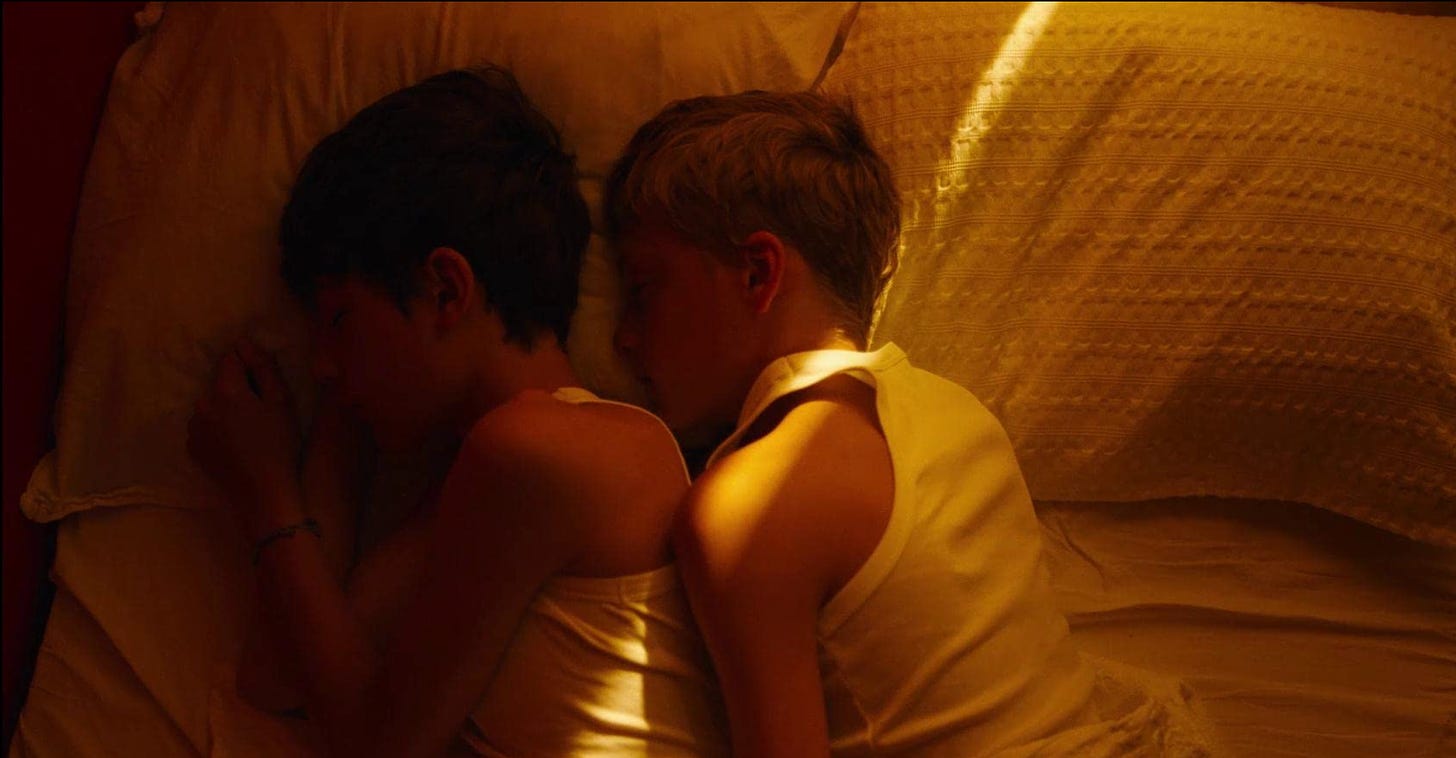
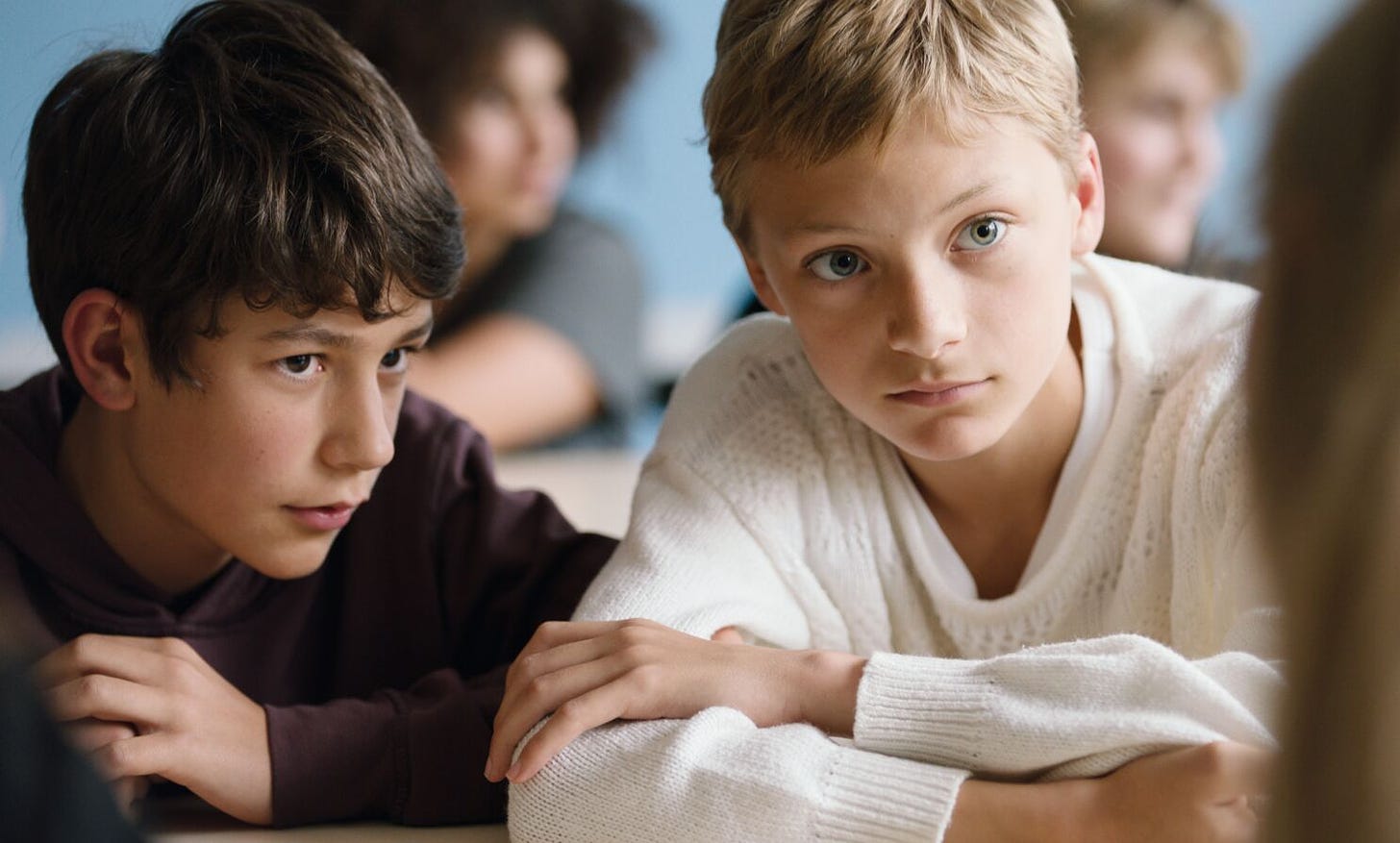
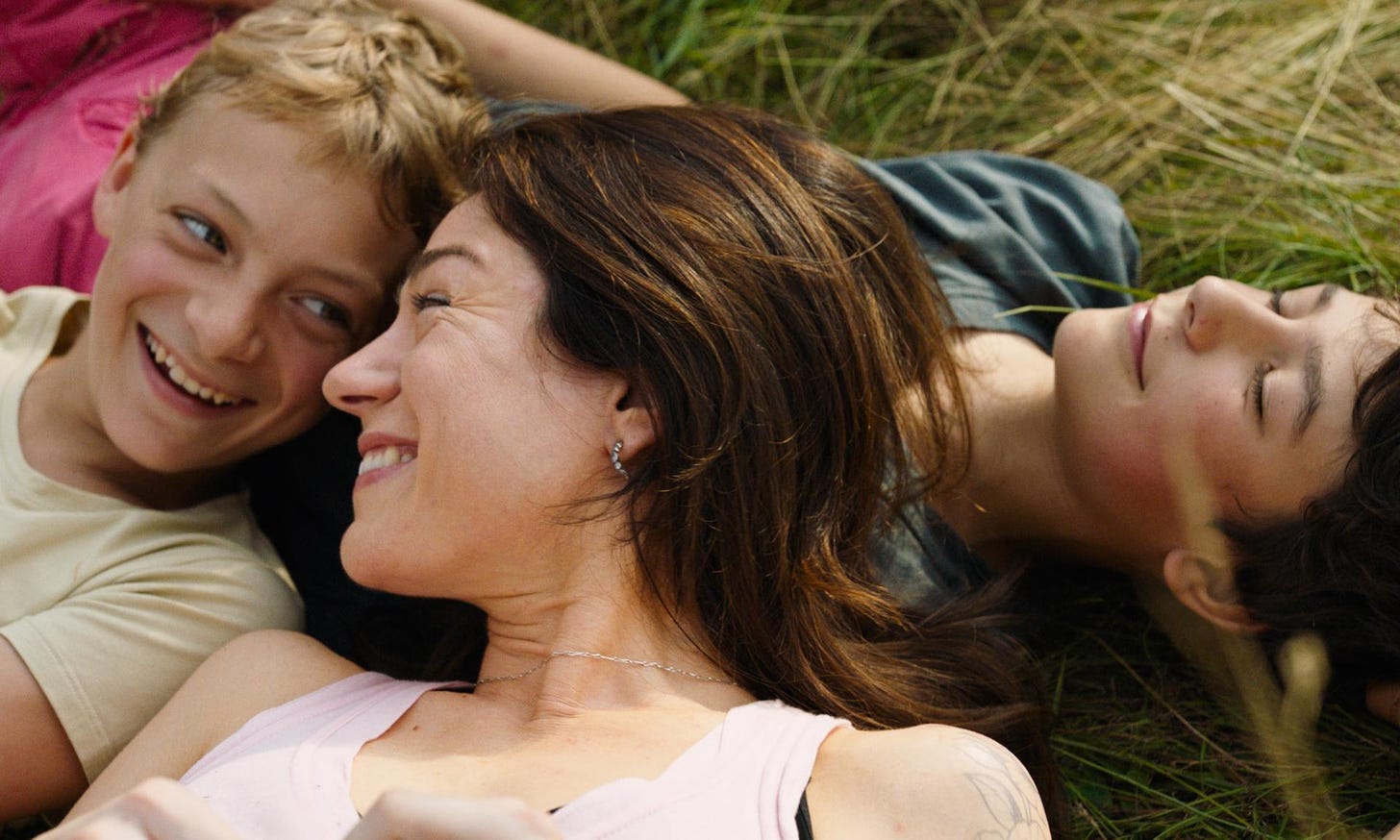
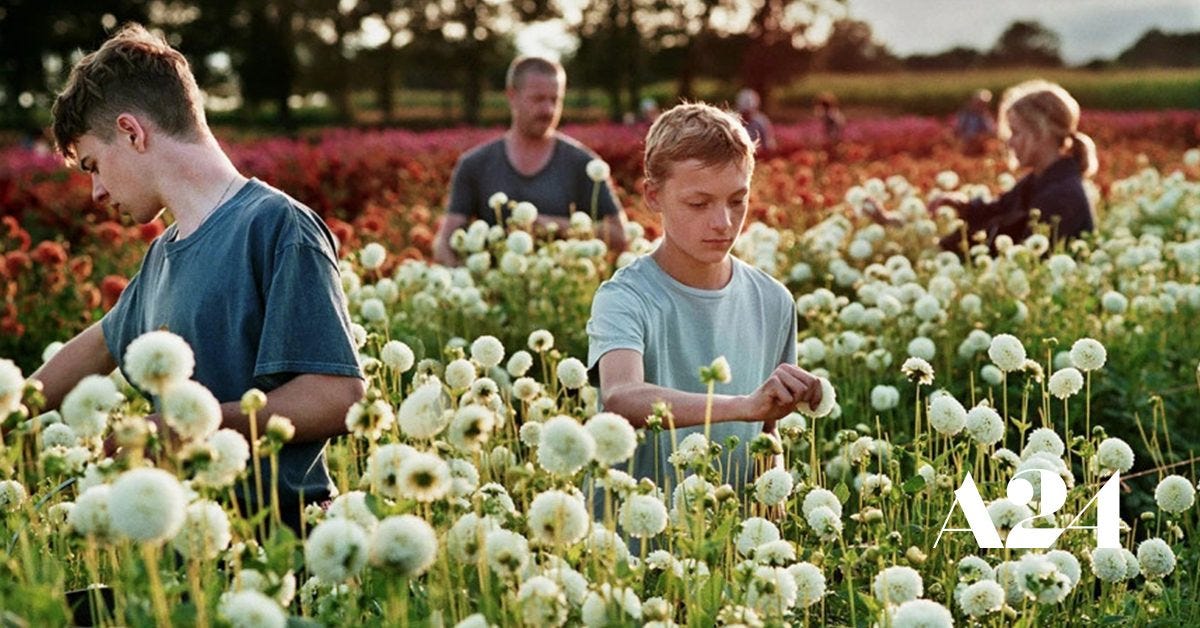
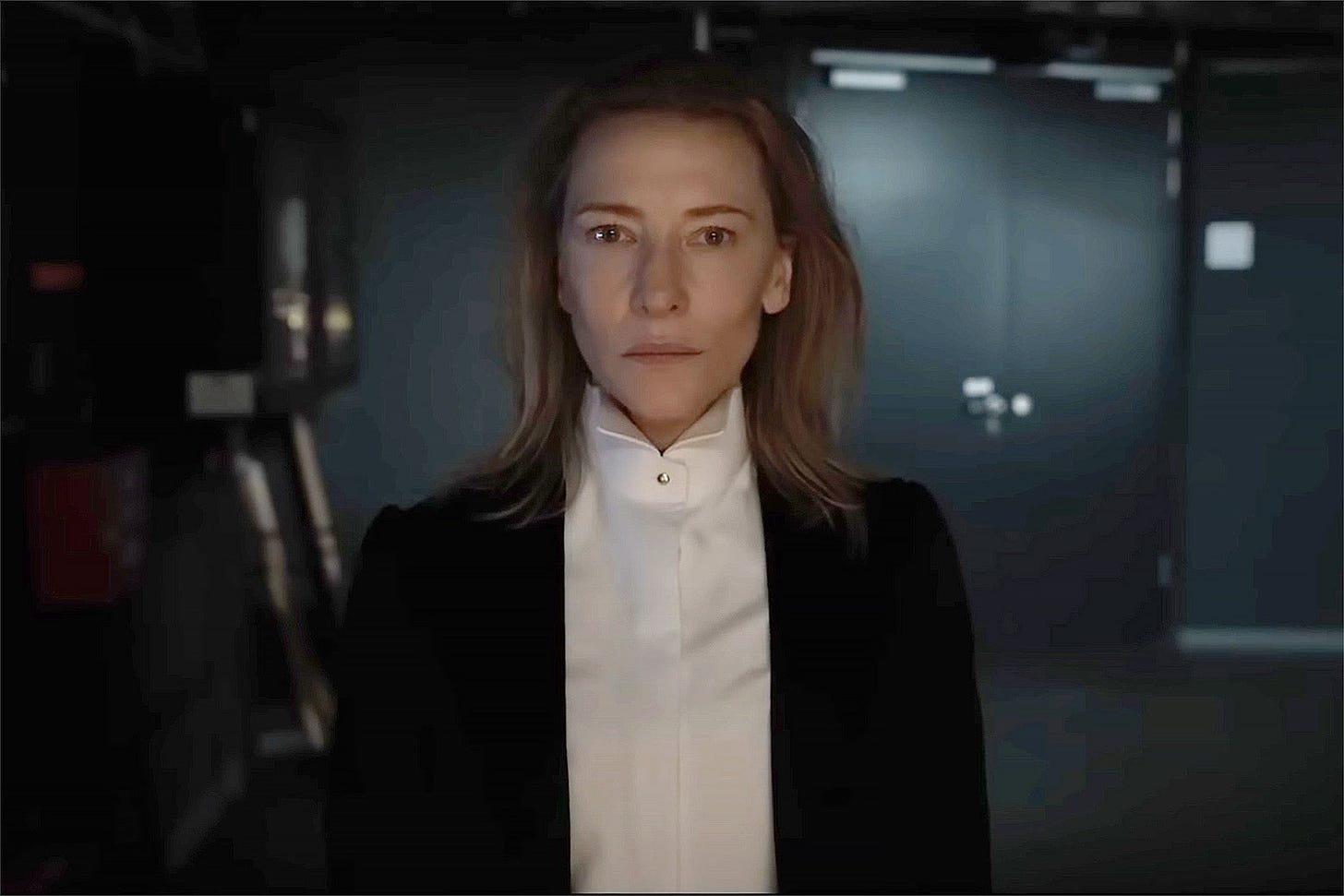
Loved this review. Can’t wait to watch the movie!